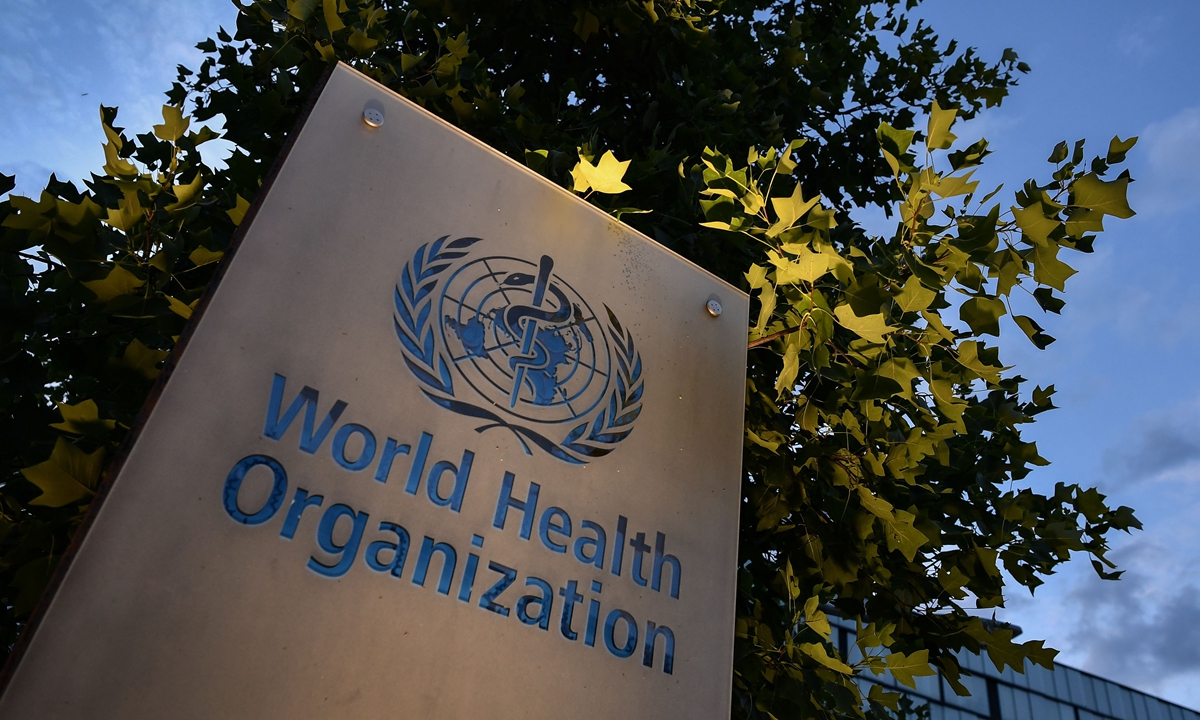
World Health Organization (WHO) File photo: VCG
Following the World Health Organization' (WHO) Monday decision to still treat the COVID-19 pandemic as a global health emergency, some senior Chinese public health experts said it was a cautious decision considering the imbalance between countries in immunity, medicine and therapy as well as potential risks of more infection waves. While some countries such as Japan and the US are planning to end or downgrade their emergency status or epidemic management in the coming months, experts warned that the conditions for dropping the guard against the disease are still immature.
COVID-19 remains a public emergency of international concern (PHEIC), the highest level of alert that the UN health body can give. However, the COVID-19 is probably at a transition point, WHO chief Tedros Adhanom Ghebreyesus said on Monday at the health body's annual executive board meeting.
The WHO's International Health Regulations Emergency Committee held its 14th meeting regarding the COVID-19 pandemic on Friday, after which WHO Director-General Tedros determined that the event continues to constitute a PHEIC, according to its website.
The COVID-19 epidemic was declared a PHEIC in January 2020, and was characterized as a pandemic in March 2020. Statistics from the WHO show that more than 6 million people lost their lives during the pandemic.
The WHO's International Health Regulations Emergency Committee acknowledged that the COVID-19 pandemic may be approaching an inflexion point given that global population has been achieving higher levels of immunity, either through infection or vaccination, which may limit the impact of the coronavirus on morbidity and mortality.
WHO's decision would be "prudent" from the public health point of view, as the level of the epidemic development is different between countries and regions with some risks still in existence, particularly the risks caused by the COVID-19 mutated strains, Zeng Guang, former chief epidemiologist at the Chinese Center for Disease Control and Prevention (China CDC), told the Global Times on Tuesday.
Despite that China has seen high vaccination rate and high natural immunity, the country still needs to be cautious as there are still more research and work to do, Zeng noted. More research could be carried out on the reason behind the fast spreading, epidemic features and whether the XBB.1.5, which has become an increasingly prevalent strain in the US, will be prevalent in China, Zeng said.
New stage
While countries entering a new stage of dealing with the three-year-old epidemic, experts warned that it's not the right time to completely drop the guard as sustainable, systematic and long-term monitoring and surveillance, as well as control action plans are still needed to mitigate the impact of the disease, especially when some countries like the US are seeing increasing deaths caused by coronavirus.
The National Health Commission (NHC) said on Monday that the COVID-19 epidemic in China has entered a period of low infection with new cases steadily declining, highlighting the effectiveness of prevention work after the country downgraded the management of COVID-19 from Class A to B in early January.
As the national epidemic situation entered a low infection period, the prevention work in rural areas remains the top priority, said NHC spokesperson Mi Feng, stressing more attention should be put on health monitoring of key groups.
When asked about whether some prevalent mutated variants such as XBB and BQ.1 popular in other countries and regions would trigger another infection peaks in China in the coming months, Li Tongzeng, chief physician from the respiratory and infectious diseases department at Beijing You'an Hospital, was quoted as saying in recent media reports that the possibility is relatively low that those strains trigger resurgence of outbreaks in the first half of 2023.
"Now many people have been infected, and they have gained a lot of immunity," he said. "At present, we should still insist on wearing masks, washing hands frequently, and opening windows for ventilation."
In face of possible new waves of infections in China, some public health experts also called for stepping up efforts in areas such as adequate preparation of medicines, enhancing grass-roots-level medical institutions, regular monitoring system to collect key data and fully understand the overall infection situation and advance sequential vaccination.
Beijing will soon launch a population serum antibody survey to fully understand the city's infection situation, Wang Quanyi, deputy director of the Beijing Municipal Center for Disease Control and Prevention, was quoted as saying in media reports on Tuesday. The study will provide a reference for optimizing resource allocation and COVID prevention and control in the future, the official said.
Currently the COVID-19 data and related analysis released by China's health authorities are objective, Zeng noted.
" Rather than simply talking about whether or not to announce the end of the COVID pandemic, the WHO should come up with more specific action plans in terms of how to deal with the infectious disease in the future, for example, the flu is an infectious disease that is globally monitored," Zeng said. "Will the COVID become an infectious disease from global attention to global surveillance? I think the WHO has not considered this point yet."
Global consequences
Despite that the WHO urged countries and regions to remain vigilant and continue reporting surveillance and genomic sequencing data, and take appropriate and targeted health measures to minimize severe cases and related deaths, some countries such as the US and Japan have decided to downgrade their COVID management in the coming months.
The Biden administration of the US on Monday said it will end COVID-19 emergency declarations on May 11, nearly three years after the country imposed sweeping pandemic measures to curb the spread of the illness, Reuters reported on Monday.
"COVID still tops the major causes of deaths in the US and we still lack of conditions for canceling the status of major public health emergency because of the low vaccination rate of the second booster shot and the daily death increase," Chen Xi, associate professor of health policy and economics at Yale University, told the Global Times on Tuesday.
To end the emergency status will surely affect the overall investment on antiviral drugs and research and development of vaccines with declining public funding to cover spending on vaccines and drugs, Chen said.


